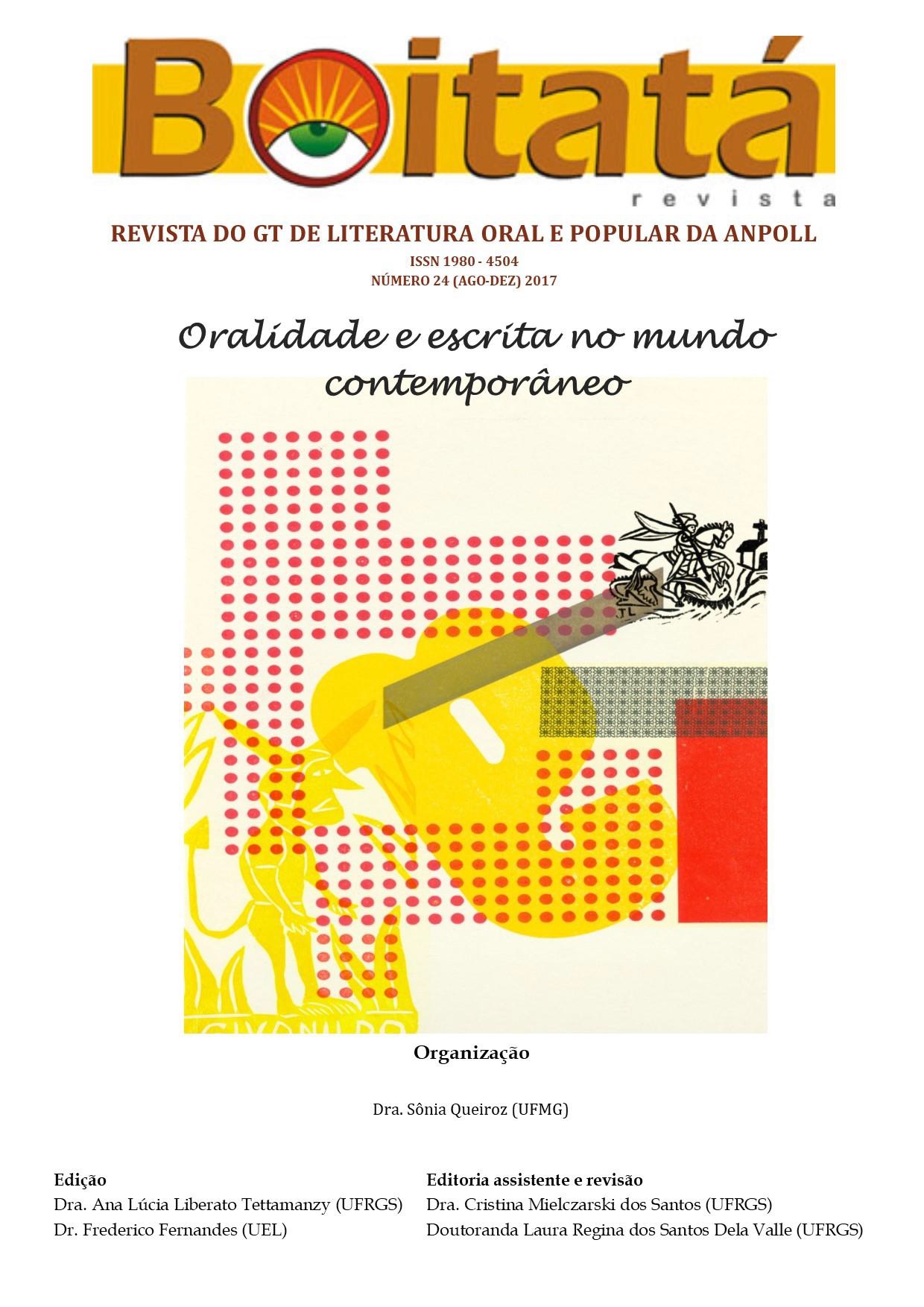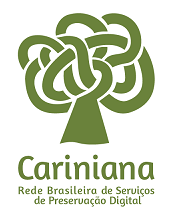The Dona do Mato and other kilombo sertanejas stories
DOI:
https://doi.org/10.5433/boitata.2017v12.e32953Keywords:
Oral Poetics, Decolonial thought, Quilombosertaneja IdentityAbstract
The community of Volta Grande, belonging to the municipality of Barro Alto (Bahia hinterland) is a rich space in oral narratives that show the way of life and legitimize the identity of a community, originally quilombola. Thus, considering the cultural manifestations and customs related to the religious and artistic practices and expressed lifestyles and transmitted by oral tradition, this article aims - from a brief selection of stories told by a resident - Sr. Dequinha - analyze beliefs, customs, habits and relationships that pervade such stories. In addition to dialogue with authors such as Costa (2015), and Alcoforado (2005, 2008) among others, in an attempt to account for important aspects of oral poetry, intended to widen the search, thinking of the community based on a sociology of absences (SANTOS, 2002) and what it is understood as a colonialist perspective (MIGNOLO, 2008). We would present stories, myths and legends that make up the quilombola imaginary and constitute the intangible heritage of the community, to the extent that they are legitimizing elements of what we understand as a quilombosertaneja identity, originating from a hinterland that is rural black.Downloads
Download data is not yet available.
References
ALCOFORADO, Doralice. O conto mítico de Apuleio no imaginário baiano. Revista Elo Estudos de Literatura Oral. Faro: Universidade do Algarve, 2005.
ALCOFORADO, Doralice. O olhar vigilante da floresta. Boitatá - Revista do GT de Literatura Oral e Popular da ANPOLL, Londrina, Número especial - ago-dez de 2008. Disponível em:<http://revistaboitata.portaldepoeticasorais.com.br/site/arquivos/revistas/1/10.%20º %20olhar%20vigilante%20da%20floresta.pdf>. Acesso em: 17 de mar. 2016.
CASCUDO, Luís da Câmara. Literatura oral no Brasil. 1. ed. digital. Editora Global: São Paulo. 2012.
CASCUDO, Luís da Câmara. Geografia dos mitos brasileiros. Editora Global: São Paulo. 2012.
CASCUDO, Luís da Câmara. Dicionário do folclore brasileiro. Editora Global: Rio de Janeiro, 1954.
CASCUDO, Luís da Câmara. Vaqueiros e cantadores. São Paulo: Global, 2005.
CASCUDO, Luís da Câmara. Supertição no Brasil. 5. ed. São Paulo: Global, 2002.
COSTA, Edil Silva. Ensaios de malandragem e preguiça. Curitiba: Appris, 2015.
DION, Sylvie. A lenda urbana: um gênero narrativo de grande mobilidade cultural. Boitatá, n.6, ago-dez 2008.
MIGNOLO, Walter. Desobediência epistêmica: a opção descolonial e o significado de identidade em política. Cadernos de Letras da UFF - Dossiê: Literatura, língua e identidade, n. 34, 2008.
MUNANGA, Kabengele. Origem e histórico do quilombo em África. In: MOURA, Clóvis. Os quilombos na dinâmica social do Brasil. Maceió: EDUFAL, 2001
PRZYBYLSKI, Mauren Pavão. A representação feminina nos lendários gaúcho e quebequense: os casos de Teiniaguá e Corriveau. Florianópolis, 2008. 289 f. Dissertação (Mestrado) -, Centro de Comunicação e Expressão. Programa de Pós-graduação em Literatura. Universidade Federal de Santa Catarina, Florianópolis.
SANTOS, Boaventura de Sousa. Para uma sociologia das ausências e uma sociologia das emergências. Revista Crítica de Ciências Sociais, n. 63, 2002.
SILVA, Simone Rezende; NASCIMENTO, Lisangela Kati do. Negros e territórios quilombolas no Brasil. CEDEM, v. 3, n.1, 2012.
SILVA, Simone Rezende. Introdução à poesia oral. Tradução de Jerusa Pires Ferreira, Maria Lúcia Diniz Pochat e Maria Inês Almeida. São Paulo: Hucitec/Educ, 2010.
ALCOFORADO, Doralice. O olhar vigilante da floresta. Boitatá - Revista do GT de Literatura Oral e Popular da ANPOLL, Londrina, Número especial - ago-dez de 2008. Disponível em:<http://revistaboitata.portaldepoeticasorais.com.br/site/arquivos/revistas/1/10.%20º %20olhar%20vigilante%20da%20floresta.pdf>. Acesso em: 17 de mar. 2016.
CASCUDO, Luís da Câmara. Literatura oral no Brasil. 1. ed. digital. Editora Global: São Paulo. 2012.
CASCUDO, Luís da Câmara. Geografia dos mitos brasileiros. Editora Global: São Paulo. 2012.
CASCUDO, Luís da Câmara. Dicionário do folclore brasileiro. Editora Global: Rio de Janeiro, 1954.
CASCUDO, Luís da Câmara. Vaqueiros e cantadores. São Paulo: Global, 2005.
CASCUDO, Luís da Câmara. Supertição no Brasil. 5. ed. São Paulo: Global, 2002.
COSTA, Edil Silva. Ensaios de malandragem e preguiça. Curitiba: Appris, 2015.
DION, Sylvie. A lenda urbana: um gênero narrativo de grande mobilidade cultural. Boitatá, n.6, ago-dez 2008.
MIGNOLO, Walter. Desobediência epistêmica: a opção descolonial e o significado de identidade em política. Cadernos de Letras da UFF - Dossiê: Literatura, língua e identidade, n. 34, 2008.
MUNANGA, Kabengele. Origem e histórico do quilombo em África. In: MOURA, Clóvis. Os quilombos na dinâmica social do Brasil. Maceió: EDUFAL, 2001
PRZYBYLSKI, Mauren Pavão. A representação feminina nos lendários gaúcho e quebequense: os casos de Teiniaguá e Corriveau. Florianópolis, 2008. 289 f. Dissertação (Mestrado) -, Centro de Comunicação e Expressão. Programa de Pós-graduação em Literatura. Universidade Federal de Santa Catarina, Florianópolis.
SANTOS, Boaventura de Sousa. Para uma sociologia das ausências e uma sociologia das emergências. Revista Crítica de Ciências Sociais, n. 63, 2002.
SILVA, Simone Rezende; NASCIMENTO, Lisangela Kati do. Negros e territórios quilombolas no Brasil. CEDEM, v. 3, n.1, 2012.
SILVA, Simone Rezende. Introdução à poesia oral. Tradução de Jerusa Pires Ferreira, Maria Lúcia Diniz Pochat e Maria Inês Almeida. São Paulo: Hucitec/Educ, 2010.
Downloads
Published
2017-12-27
How to Cite
DOURADO, Carlene Vieira; PRZYBYLSKI, Mauren Pavão. The Dona do Mato and other kilombo sertanejas stories. Boitatá, Londrina, v. 12, n. 24, p. 146–159, 2017. DOI: 10.5433/boitata.2017v12.e32953. Disponível em: https://ojs.uel.br/revistas/uel/index.php/boitata/article/view/32953. Acesso em: 10 feb. 2026.
Issue
Section
Seção Livre
License
Copyright (c) 2017 Boitatá

This work is licensed under a Creative Commons Attribution 4.0 International License.
Boitatá esta licenciada com CC BY sob essa licença é possível: Compartilhar - copiar e redistribuir o material em qualquer suporte ou formato. Adaptar - remixar, transformar, e criar a partir do material, atribuindo o devido crédito e prover um link para a licença e indicar se mudanças foram feitas.






















